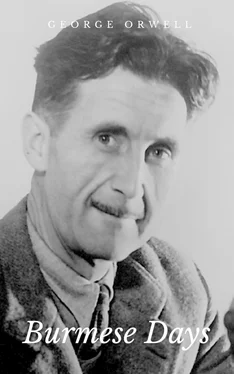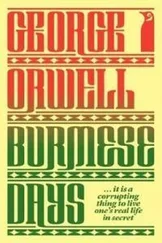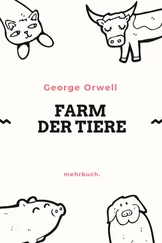The bedroom was a large square room with white plaster walls, open doorways and no ceiling, but only rafters in which sparrows nested. There was no furniture except the big four-poster bed, with its furled mosquito net like a canopy, and a wicker table and chair and a small mirror; also some rough bookshelves containing several hundred books, all mildewed by many rainy seasons and riddled by silver fish. A tuktoo clung to the wall, flat and motionless like a heraldic dragon. Beyond the veranda eaves the light rained down like glistening white oil. Some doves in a bamboo thicket kept up a dull droning noise, curiously appropriate to the heat—a sleepy sound, but with the sleepiness of chloroform rather than a lullaby.
Down at Mr Macgregor’s bungalow, two hundred yards away, a durwan, like a living clock, hammered four strokes on a section of iron rail. Ko S’la, Flory’s servant, awakened by the sound, went into the cookhouse, blew up the embers of the wood fire and boiled the kettle for tea. Then he put on his pink gaungbaung and muslin ingyi and brought the tea-tray to his master’s bedside.
Ko S’la (his real name was Maung San Hla; Ko S’la was an abbreviation) was a short, square-shouldered, rustic-looking Burman with a very dark skin and a harassed expression. He wore a black moustache which curved downwards round his mouth, but like most Burmans he was quite beardless. He had been Flory’s servant since his first day in Burma. The two men were within a month of one another’s age. They had been boys together, had tramped side by side after snipe and duck, sat together in machans waiting for tigers that never came, shared the discomforts of a thousand camps and marches; and Ko S’la had pimped for Flory and borrowed money for him from the Chinese moneylenders, carried him to bed when he was drunk, tended him through bouts of fever. In Ko S’la’s eyes Flory, because a bachelor, was a boy still; whereas Ko S’la had married, begotten five children, married again and become one of the obscure martyrs of bigamy. Like all bachelors’ servants Ko S’la was lazy and dirty, and yet he was devoted to Flory. He would never let anyone else serve Flory at table, or carry his gun or hold his pony’s head while he mounted. On the march, if they came to a stream, he would carry Flory across on his back. He was inclined to pity Flory, partly because he thought him childish and easily deceived, and partly because of the birthmark, which he considered a dreadful thing.
Ko S’la put the tea-tray down on the table very quietly, and then went round to the end of the bed and tickled Flory’s toes. He knew by experience that this was the only way of waking Flory without putting him in a bad temper. Flory rolled over, swore, and pressed his forehead into the pillow.
‘Four o’clock has struck, most holy god,’ Ko S’la said. ‘I have brought two teacups, because the woman said that she was coming.’
The woman was Ma Hla May, Flory’s mistress. Ko S’la always called her the woman, to show his disapproval—not that he disapproved of Flory for keeping a mistress, but he was jealous of Ma Hla May’s influence in the house.
‘Will the holy one play tinnis this evening?’ Ko S’la asked.
‘No, it’s too hot,’ said Flory in English. ‘I don’t want anything to eat. Take this muck away and bring some whisky.’
Ko S’la understood English very well, though he could not speak it. He brought a bottle of whisky, and also Flory’s tennis racquet, which he laid in a meaning manner against the wall opposite the bed. Tennis, according to his notions, was a mysterious ritual incumbent on all Englishmen, and he did not like to see his master idling in the evenings.
Flory pushed away in disgust the toast and butter that Ko S’la had brought, but he mixed some whisky in a cup of tea and felt better after drinking it. He had slept since noon, and his head and all his bones ached, and there was a taste like burnt paper in his mouth. It was years since he had enjoyed a meal. All European food in Burma is more or less disgusting—the bread is spongy stuff leavened with palm-toddy and tasting like a penny bun gone wrong, the butter comes out of a tin, and so does the milk, unless it is the grey watery catlap of the dudh-wallah. As Ko S’la left the room there was a scraping of sandals outside, and a Burmese girl’s high-pitched voice said, ‘Is my master awake?’
‘Come in,’ said Flory rather bad-temperedly.
Ma Hla May came in kicking off red-lacquered sandals in the doorway. She was allowed to come to tea, as a special privilege, but not to other meals, nor to wear her sandals in her master’s presence.
Ma Hla May was a woman of twenty-two or -three, and perhaps five feet tall. She was dressed in a longyi of pale blue embroidered Chinese satin, and a starched white muslin ingyi on which several gold lockets hung. Her hair was coiled in a tight black cylinder like ebony, and decorated with jasmine flowers. Her tiny, straight, slender body was as contourless as a bas-relief carved upon a tree. She was like a doll, with her oval, still face the colour of new copper, and her narrow eyes; an outlandish doll and yet a grotesquely beautiful one. A scent of sandalwood and coco-nut oil came into the room with her.
Ma Hla May came across to the bed, sat down on the edge and put her arms rather abruptly round Flory. She smelled at his cheek with her flat nose, in the Burmese fashion.
‘Why did my master not send for me this afternoon?’ she said.
‘I was sleeping. It is too hot for that kind of thing.’
‘So you would rather sleep alone than with Ma Hla May? How ugly you must think me, then! Am I ugly, master?’
‘Go away,’ he said, pushing her back. ‘I don’t want you at this time of day.’
‘At least touch me with your lips, then.’ (There is no Burmese word for to kiss.) ‘All white men do that to their women.’
‘There you are, then. Now leave me alone. Fetch some cigarettes and give me one.’
‘Why is it that nowadays you never want to make love to me? Ah, two years ago it was so different! You loved me in those days. You gave me presents of gold bangles and silk longyis from Mandalay. And now look’—Ma Hla May held out one tiny muslin-clad arm—‘not a single bangle. Last month I had thirty, and now all of them are pawned. How can I go to the bazaar without my bangles, and wearing the same longyi over and over again? I am ashamed before the other women.’
‘Is it my fault if you pawn your bangles?’
‘Two years ago you would have redeemed them for me. Ah, you do not love Ma Hla May any longer!’
She put her arms round him again and kissed him, a European habit which he had taught her. A mingled scent of sandalwood, garlic, coco-nut oil and the jasmine in her hair floated from her. It was a scent that always made his teeth tingle. Rather abstractedly he pressed her head back upon the pillow and looked down at her queer, youthful face, with its high cheek-bones, stretched eyelids and short, shapely lips. She had rather nice teeth, like the teeth of a kitten. He had bought her from her parents two years ago, for three hundred rupees. He began to stroke her brown throat, rising like a smooth, slender stalk from the collarless ingyi.
‘You only like me because I am a white man and have money,’ he said.
‘Master, I love you, I love you more than anything in the world. Why do you say that? Have I not always been faithful to you?’
‘You have a Burmese lover.’
‘Ugh!’ Ma Hla May affected to shudder at the thought. ‘To think of their horrible brown hands touching me! I should die if a Burman touched me!’
‘Liar.’
He put his hand on her breast. Privately, Ma Hla May did not like this, for it reminded her that her breasts existed—the ideal of a Burmese woman being to have no breasts. She lay and let him do as he wished with her, quite passive yet pleased and faintly smiling, like a cat which allows one to stroke it. Flory’s embraces meant nothing to her (Ba Pe, Ko S’la’s younger brother, was secretly her lover), yet she was bitterly hurt when he neglected them. Sometimes she had even put love philtres in his food. It was the idle concubine’s life that she loved, and the visits to her village dressed in all her finery, when she could boast of her position as a bo-kadaw—a white man’s wife; for she had persuaded everyone, herself included, that she was Flory’s legal wife.
Читать дальше











